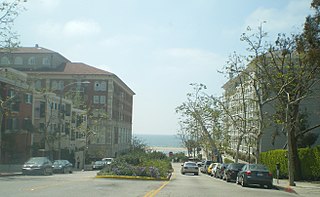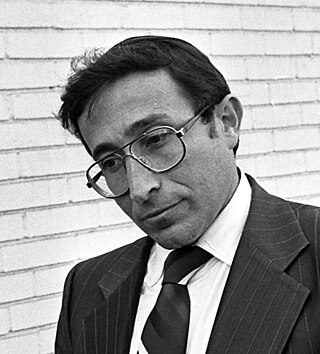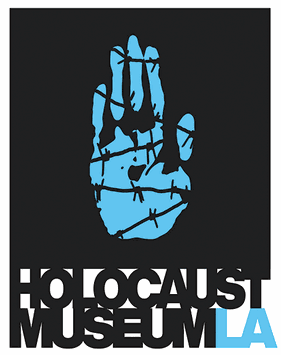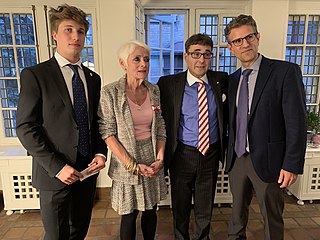
The Simon Wiesenthal Center (SWC) is a Jewish human rights organization established in 1977 by Rabbi Marvin Hier. The center is known for Holocaust research and remembrance, hunting Nazi war criminals, combating anti-Semitism, tolerance education, defending Israel, and its Museum of Tolerance.

The Austrian Service Abroad is a non-profit organization funded by the Austrian government which sends young Austrians to work in partner institutions worldwide serving Holocaust commemoration in form of the Gedenkdienst, supporting vulnerable social groups and sustainability initiatives in form of the Austrian Social Service and realizing projects of peace within the framework of the Austrian Peace Service. The Austrian Service Abroad is the issuer of the annually conferred Austrian Holocaust Memorial Award.

The Montreal Holocaust Museum is a museum located in Montreal, Quebec, Canada. It is dedicated to educating people of all ages and backgrounds about the Holocaust, while sensitizing the public to the universal perils of antisemitism, racism, hate and indifference. Through the museum, its commemorative programs and educational initiatives, it aims to promote respect for diversity and the sanctity of human life. The Museum was founded in 1979 as the Montreal Holocaust Memorial Centre and is Canada's first and only recognized Holocaust museum.

Pico Boulevard is a major Los Angeles street that runs from the Pacific Ocean at Appian Way in Santa Monica to Central Avenue in Downtown Los Angeles, California, United States. It is named after Pío Pico, the last Mexican governor of Alta California.

Marvin Hier is the dean and founder of the Simon Wiesenthal Center, its Museum of Tolerance and of Moriah, the center's film division. He has been a Track II diplomacy contributor to the genesis of the Abraham Accords.
The term Holocaust museum may refer to:

Genocide is a 1981 American documentary by Arnold Schwartzman.

The Museum of Tolerance Jerusalem is a museum, convention center and entertainment venue in downtown Jerusalem. The museum's construction was controversial due to its intrusion into the Mamilla Cemetery, a centuries-old Muslim burial site.

Holocaust Museum LA, formerly known as Los Angeles Museum of the Holocaust, is a museum located in Pan Pacific Park within the Fairfax district of Los Angeles, California. Founded in 1961 by Holocaust survivors, Holocaust Museum LA is the oldest museum of its kind in the United States. Its mission is to commemorate those murdered in the Holocaust, honor those who survived, educate about the Holocaust, and inspire a more dignified and humane world.
The Bali Holocaust Conference was held on June 12, 2007 in Jimbaran, Bali, Indonesia. The conference aimed to promote religious tolerance and affirm the reality of the Holocaust and was attended by rabbis, Holocaust witnesses, and Muslim leaders, teachers and students. This event was convened by former Indonesian president Abdurrahman Wahid, and was sponsored by the Wahid Institute, the Simon Wiesenthal Center in Los Angeles, and the Libforall Foundation. Wahid stated that although he is a good friend of Iranian President Mahmoud Ahmadinejad, his views about the Holocaust are wrong and that it really happened.

Patrick Desbois is a French Roman Catholic priest, former head of the Commission for Relations with Judaism of the French Bishops' Conference and consultant to the Vatican. He is the founder of the Yahad-In Unum, an organization dedicated to locating the sites of mass graves of Jewish victims of the Nazi mobile-killing units in the former Soviet Union. He received the Légion d'honneur, France's highest honor and the Order of Merit of the Federal Republic of Germany, Germany's highest honor for his work with Yahad-In Unum documenting the Holocaust in Eastern Europe.

The Dallas Holocaust and Human Rights Museum is a history education museum in Dallas, Texas, in the West End Historic District at the southeast corner of N. Houston Street and Ross Avenue. Its mission is to teach the history of the Holocaust and advance human rights to combat prejudice, hatred, and indifference. It features climate-controlled archives and a research library to expand education.

Daniel Landes is the former director of the Pardes Institute of Jewish Studies in Jerusalem and New York City.
The Russian Research and Educational Holocaust Center was founded in 1992 in Moscow and has since then been working on awareness raising of the Holocaust in the Russian society. It is the only non-governmental organization in the Russian Federation, devoted to the study of the life of Soviet Jews during the Great Patriotic War.

Scott Goldstein is a writer, producer, and director based in Los Angeles. He has achieved success in broadcast journalism, prime time entertainment, interactive educational & museum exhibits and documentaries. He is the winner of two Emmy and Golden Globe Awards.
David Shapell was a Polish-born American real estate developer and philanthropist from Los Angeles, California. A Holocaust survivor, he was the co-founder of one of the largest real estate development companies in Southern California. He supported Jewish charitable causes in the United States and Israel.
The Yeshiva University High School of Los Angeles is a college-preparatory, Modern Orthodox Jewish high school founded in 1979 by Rabbi Marvin Hier. It has no affiliation with Yeshiva University in New York City.

Naomi Kramer is a Canadian curator and president of the Holocaust Education and Genocide Prevention Foundation.

Abraham Cooper is an American rabbi. He is the associate dean and director of Global Social Action Agenda for the Simon Wiesenthal Center, a Jewish human rights organization. He is chairman emeritus of the United States Commission on International Religious Freedom.
















